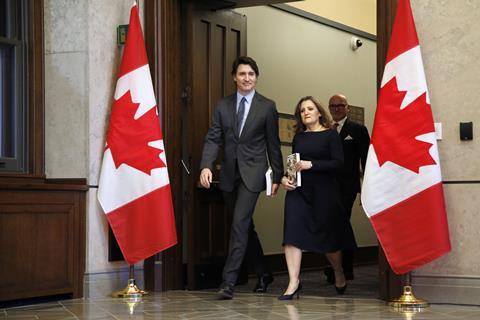Celebrating twenty years
By 2024-04-19T14:58:00+01:00
The Canadian government has pledged a significant investment in its graduate students and postdoctoral scholars after more than two decades of stagnation. Its 2024 budget proposal, announced on 16 April, provides C$825 million (£481 million) over the next five years to support next-generation researchers by increasing both the number and value of stipends. However, the pay rise will only be seen by graduates who win scarce Tri-Council grants, although it is hoped that as these stipends rise others will need to too to compete.
The budget, which the House of Commons must pass before it is finalised, would provide nearly C$200 million per year, increasing annual master’s and PhD scholarships to $27,000 and $40,000, respectively, and postdoctoral fellowships to $70,000. The budget’s passage is not guaranteed – it needs the support of at least one of three political parties other than the ruling Liberal party.
Source: © David Kawai/Bloomberg/Getty Images
Justin Trudeau, Canada’s prime minister, and Chrystia Freeland, Canada’s deputy prime minister and finance minister, presented the budget on 16 April. The package included funding that ended over 20 years of stagnation in PhD and postdoctoral stipends
The planned increases represent a dramatic jump. Currently, the typical annual stipend in Canada is around C$17,500 for master’s students, C$24,000 for PhDs and C$45,000 for postdocs. The government is also proposing C$1.8 billion to the different funding agencies in Canada over five years to increase core research grant funding.
The funding surge is expected to increase the number of research scholarships and fellowships provided by the government, building to approximately 1720 more graduate students or fellows benefiting each year.
Graduate student and postdoc pay in Canada has remained unchanged for over 20 years. A national survey last year by the Ottawa Science Policy Network found that nearly 90% of graduate students in the country reported feeling stressed and anxious about their finances, and almost one-third said they have considered leaving academia due to financial pressures.
‘These fellowships had the same value for many years, which means their ability to support students had, in many cases, fallen below a livable amount,’ explains Bruce Arndtsen, a chemistry professor at McGill University. ‘Many departments and institutions therefore needed to top these fellowships up from research grants simply to get to our normal stipend level.’
Such a significant increase to graduate student stipends in Canada will give top students a competitive stipend and enable Canada to to better retain these students, Arndtsen adds. ‘It will also allow the use of grant funds to better support their research activities rather than topping their fellowship up to needed levels.’
However, he notes that these stipend increases will only apply to the select few who win prestigious Tri-Council awards, and the majority of chemistry graduate students in Canada do not receive these top fellowships but are instead paid from research grants. In fact, Arndtsen notes that funding for the Natural Sciences and Engineering Research Council of Canada’s major chemistry funding programme has also remained stagnant for decades, and he expresses hope that these grants will receive a similar increase in the near term.
Anne Labarre, a sixth-year PhD chemistry student at McGill who is involved in computational drug discovery, celebrated the government’s announcement. Labarre says the PhD stipends at her chemistry department are currently fixed at around C$26,000 per year and emphasises that this increase is significant considering the recent inflation and rent increases in Montreal.
Matthew Berg, who received a PhD in biochemistry from Western University in Canada in 2021 and is now a postdoc at the University of Washington in the US, is optimistic. ‘These increases are going to set the bar for where funding should be for trainees in the sciences and in graduate school,’ he states. ‘Right now, a lot of Canadian graduate students struggle,’ Berg continues. ‘We’ve heard stories of students having to rely on food banks and different support systems in order to just make it through their degree.’
Last year there was a nationwide walkout of students and academics in Canada who were demanding more federal funding for graduate students and postdoc researchers. This month, graduate teaching assistants at Western University went on strike to protest what they deemed unfair wages. Meanwhile, a union representing striking academic workers at York University in Toronto, including teaching assistants and graduate workers, appeared to have reached a tentative deal on 14 April after being on strike over pay since late February.
Berg says he was lucky – he received one of one of the elusive federal awards to support him as a PhD candidate in Canada, which he says was worth about C$35,000 annually for three years. As a postdoc in the US, Berg says he currently receives significantly better compensation, with a stipend equivalent to more than C$90,000.
‘My dream after my PhD is to move to back to Canada and be a professor there,’ he says. ‘But it does make me nervous how difficult it is to get funding there and I don’t want to run a lab where my students are struggling to survive.’
Michel Cayouette, the vice president of research and academic affairs at the Montreal Clinical Research Institute, says the C$1.8 billion funding boost is great news but will be insufficient to allow supervisors to increase the value of their trainees’ stipends to the amounts announced for award recipients. ‘This means that the vast majority of students and postdocs will continue to struggle financially,’ Cayouette warns. ‘There is therefore more work to do in coming years to fill the gap in funding and ensure that all trainees receive a liveable wage.’



2024-03-06T14:30:00Z
2024-02-07T09:30:00Z
2023-02-17T12:01:00Z
2020-12-14T10:24:00Z
2020-01-15T15:37:00Z
2019-05-16T14:29:00Z
2024-04-19T09:43:00Z
2024-04-19T08:30:00Z
2024-04-18T13:30:00Z
2024-04-18T08:00:00Z
2024-04-17T13:30:00Z
2024-04-17T08:30:00Z
Site powered by Webvision Cloud


Recent Comments